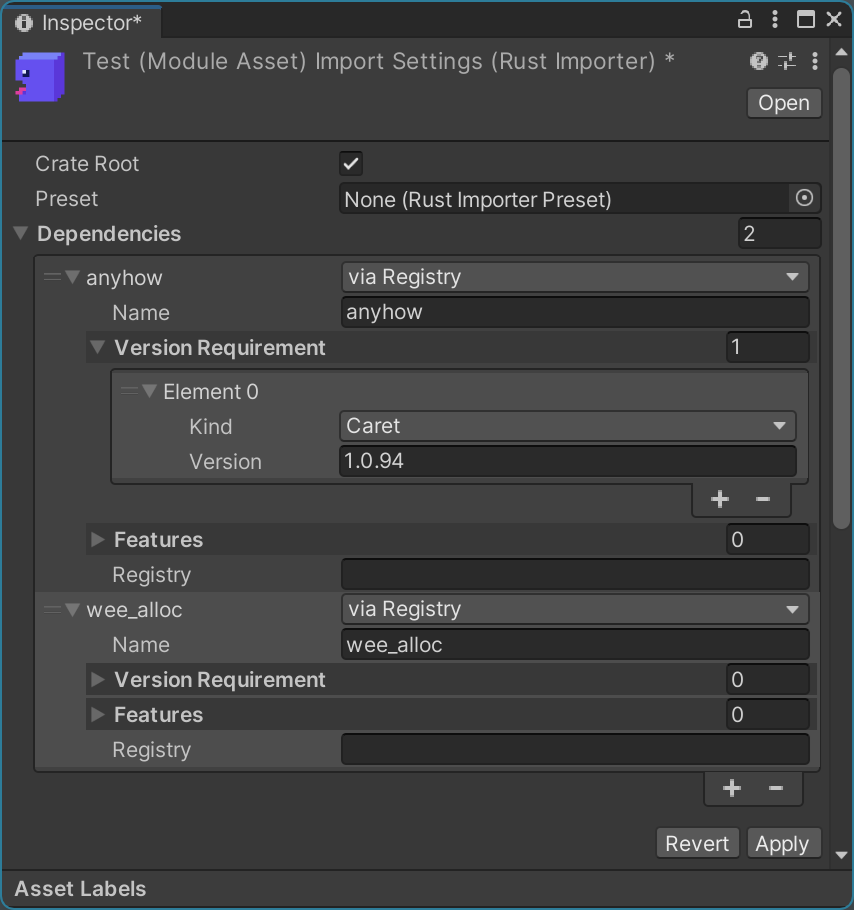Using Rust Importer
WaaS allows you to directly compile *.rs files to WebAssembly by importing them as assets.
To use Rust Importer, you need the Rust toolchain and the wasm32-unknown-unknown target.
Import Settings

- Create Root: Specify whether to treat the source file as the root of the crate. If unchecked, the source file will not be compiled directly to WebAssembly, but can be referenced as a module from other source files.
- Dependencies: Specify the packages to depend on.
- via Registry: Install packages from the package registry.
- via Git: Install packages from a Git repository.
- Componentize: Convert the WebAssembly module to a component. See Componentization for details.
Dependency
- Name: Specify the package name.
- Version Requirements: Specify the version. See The Cargo Book for details.
via Registry Specific Items
- Registry (optional): Specify the registry to get the package from. See The Cargo Book for details.
via Git Specific Items
- Git Url: Specify the URL of the Git repository.
- Branch (optional): Specify the branch name.
- Tag (optional): Specify the tag name or commit hash.
- Rev (optional): Specify the commit hash.
Rust Importer automatically recompiles when it detects changes in the source file. However, changes are not detected in the following cases:
- When the dependent source file is outside of Unity's management
- When dependent source file does not exist, and the corresponding source file is created or modified after a compilation error
- When it depends on files other than
.rs
In these cases, right-click the target source file and select Reimport to recompile it.
Also, selecting Assets > Recompile Rust scripts for WaaS recompiles all Rust source files in the project.
Using Presets
You can save the above settings as a Preset Asset for reuse.
Crate a preset asset with Create > WaaS > Rust Importer Preset then set it to the Preset field in the Rust Importer settings.
Using IDE functionality
Open the root folder of the project as a workspace with the IDE which supports Rust, and you can use the IDE's features such as code completion and syntax highlighting.
WaaS acomplishes this by generating a Cargo.toml file in the project root directory:
[workspace]
members = ["Library/com.ruccho.waas/rust/crates/*"] # Used by WaaS
resolver = "2" # Used by WaaS
Internally, Rust Importer generates crates under Library/com.ruccho.waas/rust/crates/* for each source file with Crate Root checked. Cargo.toml files generated for each crate cannot be modified by hand because they are overwritten when the Rust Importer settings are changed.
Disabling Rust Importer
To disable Rust Importer, use WAAS_DISABLE_RUST_IMPORTER define symbol.
Componentization
Refer to Component Model Tutorial for more information on componentization.
Best Practices
Version Control
It is recommended to add Cargo.toml and Cargo.lock at the root of the project to version control.
Using wee_alloc
wee_alloc is an allocator for WebAssembly with small code size.
Add wee_alloc to the dependencies and write the following:
#[global_allocator]
static ALLOC: wee_alloc::WeeAlloc = wee_alloc::WeeAlloc::INIT;
Build Settings
We can add options to optimize the code size to Cargo.toml at the root of the project:
## ...
[profile.release]
lto = true
codegen-units = 1
opt-level = "z"
Currently, Rust Importer always uses --release profile to compile.